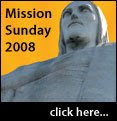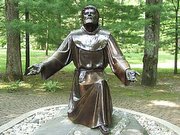2nd Station: Jesus receives his Cross
Once upon a time, it was a seed, lying on the ground, shed by its parent tree at the appointed time. Kissed by the sun and the dew, it put forth a tender shoot, a tiny root, covered with hairs that would allow life-giving water to enter its hard coat, softening it and enabling life to burst forth.
Once upon a time, the small seedling uplifted its leaves to the heavens, carolled by birdsong, caressed by a passing breeze, and life was good.
Once upon a time, the sapling waved in the wind and offered its slender branches to passing birds as they rested from their long and tiring journeys in search of food. Small animals, insects, spiders and lizards found shelter amongst the ever-strengthening roots.
Once upon a time, birds chose to nest in the spreading branches from which arose strange twitterings as eggs hatched and young nestlings pushed their way from the fragile shells that had both sheltered and confined the new life.
Once upon a time, this was a beautiful tree that drew the gaze of passers-by for its loveliness. If trees can think, it did not spare a thought for the transience of Time that waited only for the moment when its beauty could be severed at the root, the graceful branches amputated and the unique tracery of its bark stripped and cast aside for ever.
Even in its naked loveliness, the tree was not left alone. It was torn apart until the delicate lines of the passing years were laid bare. Eyes that had no right to stare dispassionately, gazed at the dark and light streamers of the wood grain that stretched from the deepest roots to the highest branches. Rough voices complained about the splinters caught in their insensitive fingers and did not spare a kind word for the wonder that had just been destroyed.
Had those who felled the tree been carpenters, then the tragedy would have been less. They, at least, would have caressed the wood with loving hands, feeling its strengths and weaknesses, drawing new grace from that which was innately tantalising. Understanding eyes would have seen the unique essence of the tree and would have tried to bring a new beauty to something that was already beautiful.
Instead, the despoilers were brutish workmen, searching only for a practicality of horror: to bring death where there had been life, to create rough planks from that which its Creator had fashioned in love.
As it lay on the bare ground, one plank was selected, not for its loveliness, for little remained to it, but, rather, for its size and unevenness. It was cruelty designed to inflict cruelty.
Yet the calloused hands that took hold of the wood were the loving, sensitive hands of a carpenter. Within an instant, those hands recognised the name of the tree, had seen its age and known the good years and the bad that had imprinted themselves on the grain of the tree, lines no pen and ruler could ever hope to copy.
The hands that took hold of the rough plank knew its potential, both that which had already been realised through the passage of the years and also that which had been thwarted by the axe of those who cut down the tree before it reached full maturity.
Even as the wood was placed on the raw and bleeding shoulders of the Carpenter, he remained just that: a carpenter. Part of his life would become the instrument of his death.
The plank and the man were ruined. “There was no form or comeliness to attract our eyes”, wrote the prophet. Where they should have been venerated, they were mishandled and abused. Yet, in their degradation, the tree and the man came together, became one in a way that would never be repeated.
In the bloodstained hands of the Carpenter, a coarse plank achieved an incomparable beauty. It would never be thrown aside. Until the end of time, the wood and the Carpenter would be united as one, so that, where One was seen, so was the other.
In the bloodstained hands of the Carpenter, the tree blossomed far beyond any human imaginings.
As the Carpenter accepted a crudely-cut plank from a despoiled tree, he, too, set out towards his Destiny.
God bless,
Sr. Janet

